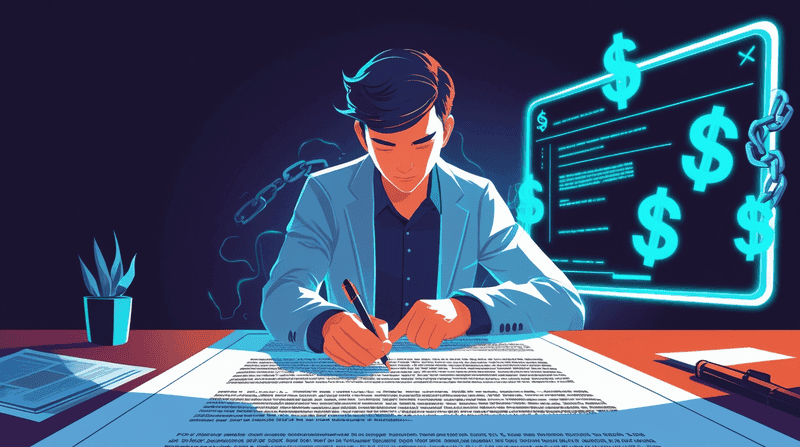Understanding Employment Contracts: A Complete Guide
Learn the key components of employment contracts and what to look for before signing.
Read MoreThe fine print is the most important part of any contract. It's where the most important and often most dangerous terms are hidden.

We've all been there. You're handed a contract, and instead of reading through every word, you skim the first paragraph, maybe glance at the signature line, and sign on the dotted line. After all, who has time to read through pages of legal jargon?
Here's the shocking truth: That seemingly innocent shortcut could cost you thousands of dollars, years of legal headaches, and potentially your entire business. The fine print isn't just there to fill space—it's where the most important (and often most dangerous) terms are hidden.
When you don't read contracts thoroughly, you're essentially giving the other party a blank cheque to include terms that heavily favour them. Here are the most common traps waiting in the fine print:
These sneaky clauses automatically renew your contract unless you cancel within a specific timeframe—often just 30 days before expiration. We've seen businesses locked into expensive service agreements for years because they missed the cancellation window buried in paragraph 47.
This legal term means you're agreeing to pay a predetermined amount if you breach the contract. The amount might seem reasonable when you sign, but could be devastating if circumstances change. One client discovered they owed $50,000 in liquidated damages for a contract they thought they could easily exit.
Many contracts include clauses that give the other party rights to your intellectual property, work product, or even ideas you discuss during the relationship. This is especially dangerous for creative professionals and consultants.
These clauses can prevent you from working in your field for months or even years after the contract ends. The restrictions might be so broad that they effectively prevent you from earning a living in your chosen profession.
Late payment penalties, interest rates, and payment schedules are often buried in the fine print. You might think you have 30 days to pay, but the contract actually requires payment within 10 days or you're hit with a 2% monthly penalty.
Sarah, a small business owner, signed a software licensing agreement without reading the fine print. She discovered two years later that the contract included a clause requiring her to pay for every user who had ever accessed the software, not just current users. The bill: $75,000 for "historical usage."
Mark, a marketing consultant, signed a client agreement that included a non-compete clause preventing him from working with any business in the same industry for two years. When the contract ended, he couldn't work with 80% of his potential clients, effectively destroying his business.
Understanding why people avoid reading contracts is the first step to changing this dangerous habit:
Yes, it takes time. Yes, it's boring. But it's essential. Set aside dedicated time to read through every word, even if it takes hours.
Tools like ScanTract can quickly identify the most important and potentially problematic clauses, saving you time whilst ensuring you don't miss critical details.
Don't be afraid to ask for clarification on any terms you don't understand. A legitimate business will be happy to explain their contract terms.
Remember: contracts are negotiable. If you don't like a term, ask for it to be changed. The worst they can say is no.
For important contracts, consider having a lawyer review them. The cost of legal review is often far less than the cost of a bad contract.
Reading contracts thoroughly isn't just good practice—it's essential for protecting your interests, your business, and your financial future. The few hours you spend reading and understanding a contract could save you from years of regret and thousands of dollars in unexpected costs.
Don't let the fine print burn you. Take the time to read, understand, and negotiate your contracts. Your future self will thank you.
Don't let another contract catch you off guard. Use ScanTract to quickly identify the most important clauses and potential risks in any contract.
Analyse Your Contract NowLearn the key components of employment contracts and what to look for before signing.
Read MoreCommon pitfalls in rental agreements that could cost you money and stress.
Read MoreMaster the art of contract negotiation with these proven strategies.
Read More